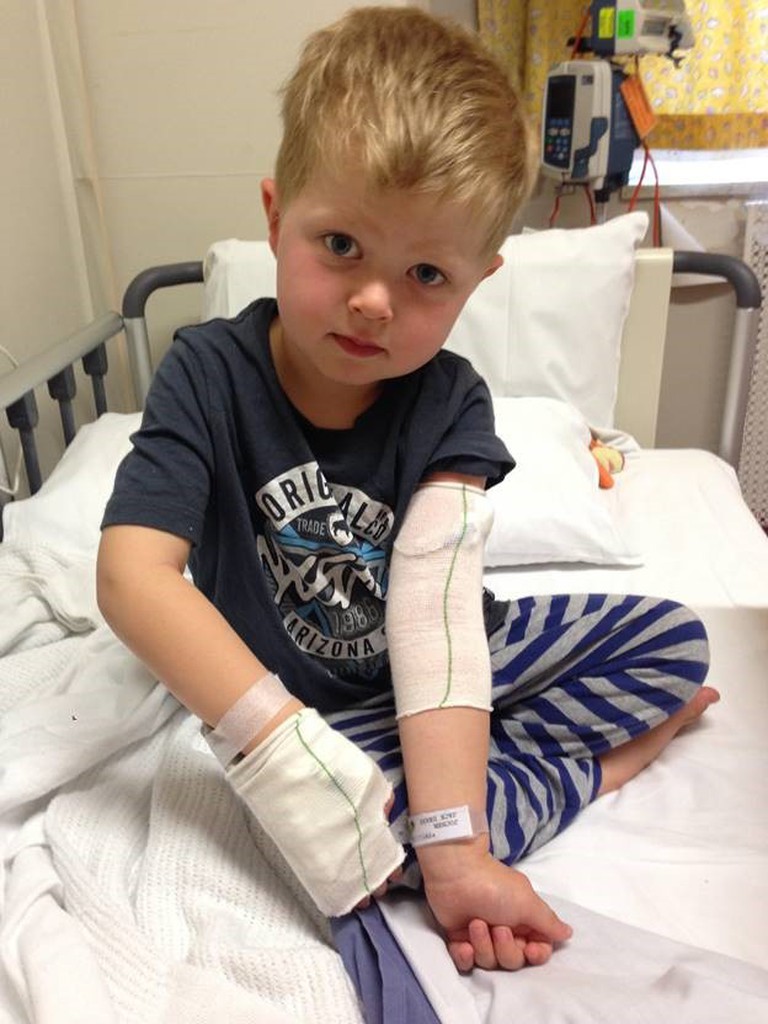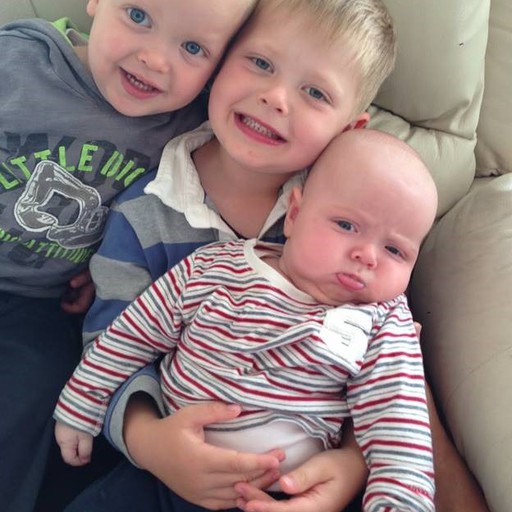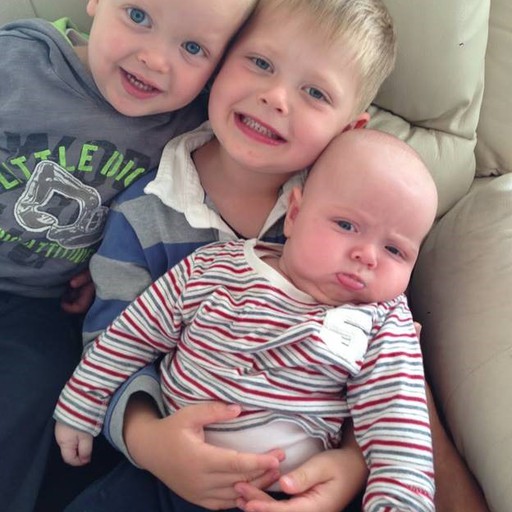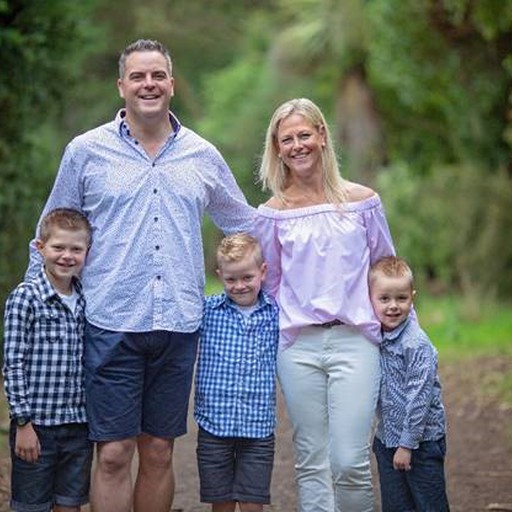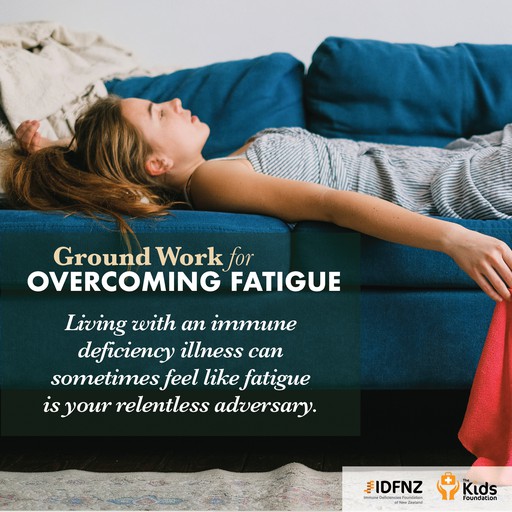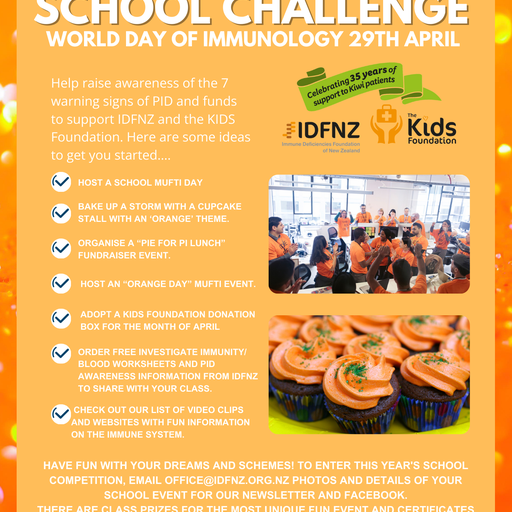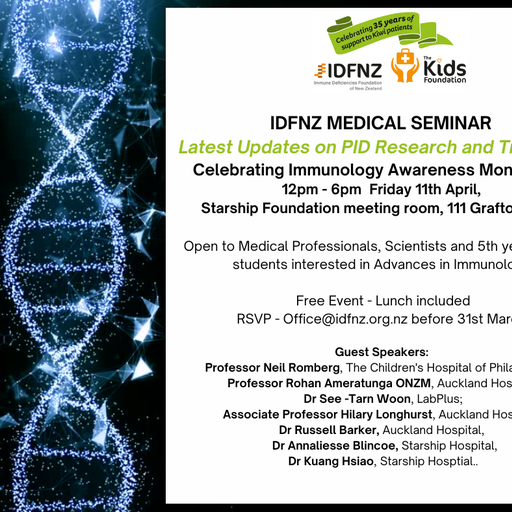My Story:
Jack
From Christchurch
Jack's Story
To have one child in your family with a condition that can be life threatening is hard, but to have two out of your three children suffering from it is particularly difficult. However, to look at the Jochem family you wouldn’t know that they have been through a lot of hard times and struggled with fear of the future.
Simone says it is hard to pinpoint the beginning of the family’s journey. Jack was a bonny baby and seemed to be thriving for the first few months of his life. He was a good weight and was hitting initial milestones as he grew. At 6 months of age he was a solid 10kgs!
However, when Jack reached 5 months old, he started suffering recurring colds and infections which just did not seem to go away, or at least would last for 3-4 weeks on end. The family doctor was not overly worried, but Simone’s intuition was telling her there was something much more going on. The sicknesses were becoming so frequent and serious that the little family was visiting their GP up to three times in one week, and making regular visits to the Children’s Acute Assessment Unit at Christchurch Hospital, trying to discover what was going on with Jack.
At 6.5 months Jack was treated with the first of many doses of antibiotics for a chest infection and ear infection. Jack was losing his healthy colour and turning an insipid pale. His appetite had diminished and he cried endlessly. Thankfully, he had had the chubbiness of a bonny baby to fall back on. His Plunket Nurse was worried about him and the fact he was losing weight, and his family were worried too as their once happy little baby was now crying constantly. At one-point Simone was encouraged to feed him pure cream to try and help get his weight up!
By the time he was almost 9 months old Jack was still sick with the same ongoing chesty cough, he hadn’t eaten for about 6 days, was vomiting regularly and was lifeless and sleepy as a result of all the dehydration. He was admitted to CAA (Children’s Acute Assessment) yet again. This time his oxygen stats were so low they immediately admitted him knowing something was not right. He was now only just on 9kgs (he’d lost 1kg already). Finally, they started some blood work and x-rays. Jack was diagnosed with severe pneumonia. Antibiotics were administered to battle this immediately.
Jack made remarkable improvement over his few days in hospital and was sent home. However, 6 weeks later at 11.5 months, Jack was still battling the crackling in his lungs, coughing so much he was throwing up, was pale and crying endlessly. Back to CAA for re-tests and more investigations.
Finally, Dave and Simone met with Paediatric Respiratory Specialist Prof Phillip Pattemore to discuss the pneumonia which was still present (6 weeks on from initial diagnosis and treatment). Professor Pattemore suspected something more was going on here. He ordered some specific bloods to be done and introduced the family to Dr Tony Walls (who became and is still Jack’s Christchurch Specialist). After more antibiotics and two weeks of anxious waiting, Jack was diagnosed with XLA (X-linked agammaglobulinemia), also called Brunton’s Disease. This is a rare disorder that affects males and means they have no B cells in their body. When no B cells are present it means the body can’t produce any antibodies at all to fight off infections.
Jack was admitted to Christchurch Hospital and put on an IV for IntragamP (plasma product containing the antibodies his body was so sorely lacking and so desperate for) and strong antibiotics to fight off all the current infection. After 3 solid days of IV Jack was a different boy, and within a week he was bouncing off the walls! He was cheeky and giggling again, he had endless energy, was sleeping well, and put on 65 grams in a week!
After that came regular hospital visits every two to three weeks to get his IV infusions to top his body up with more antibodies to help fight infections and colds. At this point Dr Tony Walls suggested subcutaneous infusions could be a better choice for Jack since he was young, and this would limit the amount of time he would need to be in hospital for in the future. So, in April 2012, only 2 months after Jack’s diagnosis, Dave and Simone, 1 year old Jack and Simone’s Mum Elma, made their way to Starship Hospital to begin their training on sub-cutaneous infusions. A week later they were self-sufficient, with the help and support of NZ Blood Service and the amazing Christchurch Outreach Team. At this point Jack became the youngest New Zealand patient to receive home-based subcutaneous infusions.
The infusions are called IGG or Evogam and are produced from the plasma of New Zealand donors, which is shipped to Australia. Here the plasma is treated and separated into its various components – one of which is the EVOGAM (or IGG) which Jack now infuses weekly.
This is administered through an inch-long needle into the thigh via a pump or push syringe. The fluid is pumped under the skin over about an hour and settles into an egg-shaped bump which then dissipates as it is taken through the body over the next few hours.
For Jack, getting used to the treatment was quick and relatively easy considering he was still so young, though bribery with chocolate and lollies often helped smooth the way when things became too much for little Jack. His parents didn’t initially cope as well with inserting the needle each time, particularly in the early days. Dave and Simone both work together or in turns at administering the infusions weekly, and supporting each other especially through the challenging years when there was some resistance by both boys to having their infusions done. Simone’s mum is also a nurse, so she was a great home support during these early times too, and still does occasional infusions for the boys too.
In October of 2012 Jack’s younger brother Liam was born. He was tested at two weeks of age for the XLA gene. His test was negative. From the time Liam was old enough to move around he became Jack’s right-hand friend and helper at infusion time. And to this day he still helps every week, getting the gear together, finding “treats” and running around after Jack. He is super caring and empathetic when it comes to understanding and dealing with these times.
In December 2014 Simone gave birth to another boy, Harry. Because of Jack having XLA, Harry was also tested and at two weeks old. This time the result didn’t come back negative as with Liam’s. Instead the family were told their youngest son also had XLA. At eight weeks of age little Harry started on subcutaneous infusions too. By this stage Dave and Simone were experts at administering but having to do this on a newborn was initially super hard Simone recalls.
Simone agrees it was a challenge to manage both boys’ infusions at first, but as they got older, they have become more adept at managing themselves.
Jack has had a lot more to deal with these days compared to Harry, as he wasn’t diagnosed until he was over a year old. Due to having had pneumonia in his lungs for months before finally receiving the treatment they needed, it has resulted in permanent damage. This means Jack receives a lot more ongoing additional treatment for this, which Harry doesn’t share with him. And although on the weekly infusions, this doesn’t mean the boys don’t get sick anymore either. Jack has had his share of visits to CAA and hospital since, including long doses of antibiotics and PICC lines for stubborn infections.
Liam has at times found it hard to be the ‘odd one out’ around his brothers, as he is the only sibling without XLA. But Liam more than makes up for this, by gracing his brothers with his readiness to help and support both Jack and Harry in every way possible throughout their weekly infusion times and hospital visits.
The family are grateful for the blessing of the subcutaneous infusions. Without them Harry and Jack would be having to visit the hospital every week or so for IV infusions, instead of being able to manage things from the safety and comfort of their own home (or even when away if need be). As it is, they only visit Christchurch Hospital every 6 months for regular check-ins with Dr Tony Walls, and then annual check-ups at Starship Hospital in Auckland.
To make the Auckland trip easier on everyone (travelling with 3 energetic boys isn’t always that straight forward!!!), and so it doesn’t just become a place to go to get poked and prodded, the Jochem’s have made their trips up to Auckland fun family holidays. They take a few extra days around the hospital appointment day and do fun activities in and around Auckland. They loved the use of the IDFNZ holiday home at Red Beach Top10 Holiday Park as a getaway last year. This was one of the most memorable Auckland trips they’ve done yet and the boys still talk about it to this day. The support and help that IDFNZ has given them over the past 8 years is hugely appreciated!!
Due to Covid this year, the family isn’t traveling up to Auckland, but have scheduled further check-ups in Christchurch with their specialist there. While the country was ramping up to lockdown earlier this year, the Jochem’s even went into their lockdown early to keep Harry and Jack extra safe. Simone made sure to stock up on Evogam & all their infusing stocks, as well as food and other essentials so that they wouldn’t need anything during lockdown. The family found schoolwork tough going over this time (like many did) as all three boys are at different levels in school and have different needs. However, they were able to make lockdown fun by organising some big projects to complete as a family such as a building a chicken run and coop and constructing a large hut in the back yard. The fear and worry of what you can’t see is hard Simone says, but they are trying to instil in her boys the belief that they can do anything they put their minds to, they just need to remember to take care of themselves in the process.
These days Jack is on 20mLs of Evogam a week via his pump and Harry is on 15mLs via a push syringe. These volumes will increase as the boys grow and will continue to be a part of their weekly routine for the rest of their lives. The family have found that Saturday morning currently works the best for them to do the boys infusions, as they can administer it earlier in the morning and then have an active day ahead to allow the IGG to dissipate through their bodies.
The Jochem’s wish for their boys to have as much of a normal life as possible. Simone doesn’t want to put her fear or concerns on them, but she also knows that she needs to prepare them for their futures, to help them to become aware of how they manage themselves and their treatments. She wants them to be empowered to stand up for themselves in all they do, and to know that when they don’t feel right/healthy, that they can push for tests and ask for more information, medically speaking. She says that when Jack was little, she felt like a neurotic mother who was over-worried about her baby, because he hadn’t been diagnosed yet and she was always at the GP with him and worrying about him. However, Dave agrees that if he and Simone hadn’t trusted their instincts as parents and kept pushing for answers, things may have been a lot worse for Jack. The Jochem boys are being taught to not hold back from life and what they want to achieve, but to be mindful of how to keep themselves safe and healthy in all that they do, and that they will always have the support and unconditional love from their parents behind them.

